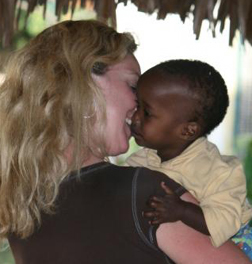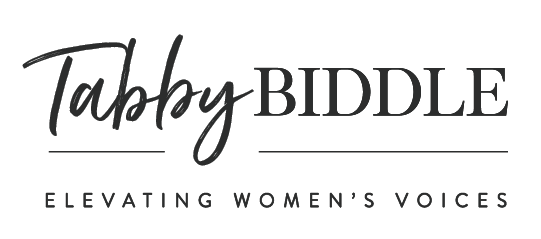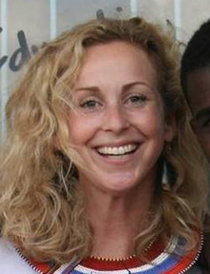Anne Wells is Goddess of the Week!
Interview with Anne Wells
by Tabby Biddle
"For me, each and every experience in Tanzania leaves me humbled, grateful and yearning for more!" -- Anne
T: Tell me about the work that you do.A: I recently founded the social organization “UNITE The World With Africa” to empower and facilitate meaningful giving and service opportunities between Americans and Tanzanians. Specifically, I design and run humanitarian outreach tours to Africa in which participants are partnered with their peer-counterparts to share their time and talents in targeted and impactful ways.T: Why do you do this work?A: I believe it is of utmost importance to get more Americans directly involved in international development. We all can’t be Angelina Jolie or an ambassador for CARE or Save The Children, but we can do our part and contribute. I believe that extreme poverty on this planet is ALL of our problems… not just those who suffer directly. First, it is our duty to care. As David Lamb so eloquently writes in his book The Africans, “To be oblivious to the problems of Africa is to promote more international misery, hunger, instability – and to increase threats to peace in the world.” And second, it is our human right to care. When we stand side-by-side and celebrate all that unites us … our common humanity … we grow. We develop. We break down walls in our hearts. Our lives are forever better.By bringing Americans to Tanzania in a manner in which they can cultivate meaningful relationships, give of themselves in personal and impactful ways, and experience village life as it is – not as it may be seen through the eyes of a tourist – I believe that we create the space and opportunity for transformation. While most first-time visitors may be struck and saddened by the extreme poverty, more so they are deeply touched by the rich Tanzanian sense of community, family and faith. It is my experience that when someone has nothing to give (meaning no “things”) they give of themselves… their hearts, truths and joys. It is here that I believe we are starving as a people.So, I chose this path to facilitate and empower giving and receiving, learning and teaching, self-exploration and discovery. For me, each and every experience in Tanzania leaves me humbled, grateful and yearning for more!T: You have a Women’s Empowerment tour coming up. Tell me about that.A: During our 2010 June tour our team will work alongside our Tanzanian peer-counterparts and extended community partners -- in a series of train-the-trainer style workshops -- to address some of the most pressing issues faced by women in rural Tanzania, including maternal & infant health; education; vocational training & microfinance and business development; HIV/AIDS education; leadership training; and more. During our time in-country we will visit with schools, orphanages, women’s groups, medical clinics and others groups/organizations in the Northern District of Tanzania.
T: How do you put together your outreach tours?A: To execute these tours, I partner with a number of local grassroots non-profit organizations that are doing their work in excellence and having a positive and measurable impact on their communities, and who are also in great need of support and assistance from the West.With my partners, I take a look at the unique skill sets of my given Team -- which this year includes women’s health, public health, leadership training, microfinance, business development and economics, education and even jewelry making -- and overlay that with a thorough community-level needs assessment, and then we determine the best way to put my Team to work during our time in country. Prior to our arrival, we collaborate to create requested training materials, and my Team also works to raise funds directly for UNITE’s NGO partners to support their programmatic work in Tanzania.T: How does your Team raise funds?A: We do everything from bake sales, private parties and corporate giving to used-clothing, book and medicine drives. A little goes a long way, and each UNITE team member is asked to do his or her best to support our friends in need.T: You used the term “work in excellence.” What does that mean? A: What I mean by that is that the NGOs we partner with are moving within the natural flow of the villages. They are "bottom up," not "top down" approaches. Their work and programs are sustainable and scalable. They empower local people through education, microfinance programs, vocational training, etc. In other words, they don't create a dependence on hand-outs.T: This is really incredible work you are doing. How did you choose this path?A: I have a long history living, studying and working in Tanzania. My first visit was in 1991 as a student of wildlife and human cultural management. I literally “fell in love” with the country and have been working to build bridges back ever since.In 1994 I traveled alone through the northern district spending time at a snake park and dairy farm and even charting a walking safari to the Maasai Mountain of God – Oldoinyo Lengai. Years later, while living in St. Louis – after being married, having three young daughters and establishing a successful career as a writer, journalist and marketing/communications executive – I met a man named Father Dennis Mnyanyi, an Anglican priest from Tanzania. Dennis and I became fast friends, and he tolerated my endless questions about Tanzania, development and how Americans can best be of service – if indeed at all. Dennis requested that I come to Tanzania to identify local Tanzanian-run groups doing their work in excellence for whom I could garner for support in the U.S. I did that with my husband in 2008, and a year later in 2009 I brought my first group of 14 Americans to Tanzania.T: How did that go?A: We worked in a number of villages teaching First Aid, basic lifesaving and public health. We visited schools and orphanages, parishes and women’s groups, hospitals and clinics, and as a result of those experiences – I believe – the trajectory of lives were changed.When I came from that tour, I left my job as the marketing director of a prominent U.S.-based NGO and committed myself full-time to growing this work in Africa. And today not only do I have a network of brilliant and trusted local leaders in Tanzania who have partnered with me to grow this venture and continue to plant the seeds of change, but I also have the commitment and faith of the Americans who travel with me. I am the bridge, and for that I am deeply blessed.T: It sounds almost seamless. What have been some of the obstacles?A: Wow -- they are many! My biggest challenge is determining how to organize and mobilize people who are thousands of miles apart with extremely different cultures and expectations to come together to have meaningful and impactful exchanges in a concentrated period of time. Also, finding the support I need has been a long, laborious process. Not everyone wants to spend two weeks of their year SERVING others in rural Africa. So I court many dozens and dozens of people for each team member that commits. And fundraising for my non-profit partners in Tanzania is an ongoing challenge.T: How have you moved through these challenges?A: I have partnered with a handful of excellent leaders in Tanzania with whom I work to address -- to the best of our abilities -- all questions and
public health. We visited schools and orphanages, parishes and women’s groups, hospitals and clinics, and as a result of those experiences – I believe – the trajectory of lives were changed.When I came from that tour, I left my job as the marketing director of a prominent U.S.-based NGO and committed myself full-time to growing this work in Africa. And today not only do I have a network of brilliant and trusted local leaders in Tanzania who have partnered with me to grow this venture and continue to plant the seeds of change, but I also have the commitment and faith of the Americans who travel with me. I am the bridge, and for that I am deeply blessed.T: It sounds almost seamless. What have been some of the obstacles?A: Wow -- they are many! My biggest challenge is determining how to organize and mobilize people who are thousands of miles apart with extremely different cultures and expectations to come together to have meaningful and impactful exchanges in a concentrated period of time. Also, finding the support I need has been a long, laborious process. Not everyone wants to spend two weeks of their year SERVING others in rural Africa. So I court many dozens and dozens of people for each team member that commits. And fundraising for my non-profit partners in Tanzania is an ongoing challenge.T: How have you moved through these challenges?A: I have partnered with a handful of excellent leaders in Tanzania with whom I work to address -- to the best of our abilities -- all questions and  challenges in advance of my team's arrival. And, as I said earlier, we partner my UNITE team members with their peer counterparts in Tanzania so a doctor is training medical professionals, a teacher is working with teachers and educators, etc. This effort, combined with tons of advanced preparation and communications, empowers us to be impactful during our time in country.
challenges in advance of my team's arrival. And, as I said earlier, we partner my UNITE team members with their peer counterparts in Tanzania so a doctor is training medical professionals, a teacher is working with teachers and educators, etc. This effort, combined with tons of advanced preparation and communications, empowers us to be impactful during our time in country. And – thankfully -- with each passing day, week, month I find a few more people who care and want to help… be it with Global Girls UNITE (my mommy-daughter club) or with fundraising or gathering items for second suitcases. Some even say they want to come with me to Africa some day!! So I focus on the miracle of these people who indeed DO care and are willing to give of their time, talent and treasure to support those in need in a world away. These people give me the fuel I need to carry on!T: Bless those people! What about fears … have you had any?A: My two main fears are sickness and dissatisfaction. The sickness threat is obvious -- Africa is Africa and lots can go wrong. However, I do everything possible to keep my team healthy and after ensuring safe transport, water, food, lodging, bed nets, malaria meds, vaccines, etc.... I just have to pray for the best. As for dissatisfaction, I am doing everything in my power to ensure that my team has an extraordinary, unique, personalized, impactful and meaningful experience, but of course I cannot guarantee that they feel these things -- even if I do!But honestly I believe that these fears are in fact good because they remind me of the illusion of control and bring me back to my very strong and very clear faith. My faith gives me courage, laser focus and a strength and stamina I didn't know I had. This work that I do is really about God, the universe, and the divine that resides deep within us all and UNITES us. When I feel alone, overwhelmed, scared or simply exhausted, I pray for guidance and strength... and so far so good because I am still here, working at it as hard as I can!! T: Wow! That is powerful. How can other people get involved with the work you are doing?A: People can get involved with UNITE The World With Africa in a number of ways.
And – thankfully -- with each passing day, week, month I find a few more people who care and want to help… be it with Global Girls UNITE (my mommy-daughter club) or with fundraising or gathering items for second suitcases. Some even say they want to come with me to Africa some day!! So I focus on the miracle of these people who indeed DO care and are willing to give of their time, talent and treasure to support those in need in a world away. These people give me the fuel I need to carry on!T: Bless those people! What about fears … have you had any?A: My two main fears are sickness and dissatisfaction. The sickness threat is obvious -- Africa is Africa and lots can go wrong. However, I do everything possible to keep my team healthy and after ensuring safe transport, water, food, lodging, bed nets, malaria meds, vaccines, etc.... I just have to pray for the best. As for dissatisfaction, I am doing everything in my power to ensure that my team has an extraordinary, unique, personalized, impactful and meaningful experience, but of course I cannot guarantee that they feel these things -- even if I do!But honestly I believe that these fears are in fact good because they remind me of the illusion of control and bring me back to my very strong and very clear faith. My faith gives me courage, laser focus and a strength and stamina I didn't know I had. This work that I do is really about God, the universe, and the divine that resides deep within us all and UNITES us. When I feel alone, overwhelmed, scared or simply exhausted, I pray for guidance and strength... and so far so good because I am still here, working at it as hard as I can!! T: Wow! That is powerful. How can other people get involved with the work you are doing?A: People can get involved with UNITE The World With Africa in a number of ways.
- They can come with me on a tour. I will be returning to Tanzania each year and also expanding into new countries. For example, this fall I will be in Botswana scouting an outreach tour in parts of the Kalahari Desert. I am always looking for bright, motivated, committed and adventuresome individuals who want to join me!
- They can work with me to raise funds for my partner NGOs in Africa. I work with small, grassroots organizations that do what they do in excellence but that also need lots of support. Friends often support UNITE by hosting house parties during which I can speak to their extended networks about the work we do and our beneficiaries, and about the very specific tasks/expertise that we need at that given moment.
- They can help spread the word by sending news of UNITE to their friends and colleagues who may be interested in doing hands-on development work in Africa.
- They can email me directly at atmwells@gmail.com, and we can brainstorm. I am always open to new ideas and possibilities.
T: Thank you Anne! A: Karibu sana! (You are most welcome!)


